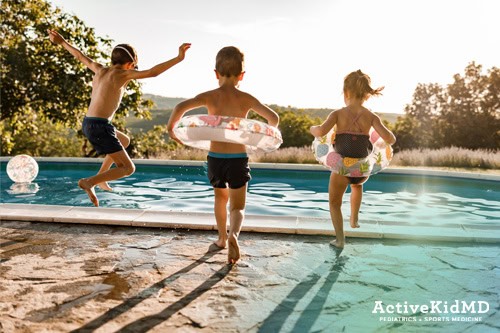How to Keep Active Kids Safe, Healthy, and Injury-Free This Summer
Summer brings longer days and plenty of opportunities for kids to stay active—whether it’s biking around the neighborhood, playing pickup sports, or splashing in the pool. With increased activity may also come a higher risk of injuries. The following are some simple but effective tips to help prevent the most common summertime injuries.
-
Ease Into Activity & Listen to the Body
- If your child has taken a break after spring sports or school, avoid jumping back into intense physical activity too quickly. Gradually increasing activity levels help prevent sprains, strains, and overuse injuries.
- Watch for warning signs like soreness, limping, or complaints of pain. Don’t ignore these. Addressing them early can prevent more serious issues.
-
Mix Things Up
- Summer months are great times for exposing kids to new and different activities.
- This exploration can reduce overload from repetitive movement patterns (overhead throwing, jumping) and can also be the start of a new “favorite” sport.
-
Build in Regular Rest
- Kids need downtime, especially after seasons filled with high levels of activity or during summer camps or practice sessions. We highly recommend at least one rest day per week from organized practices, camps or competitions to give muscles and joints time to recover.
- Make sleep a priority—aim for 8½ hours or more. Quality sleep is essential for healing and peak performance.
Also see: Optimizing Effective Sleep Patterns for Higher Performance
-
Stay Hydrated and Fuel the Body
- Dehydration can set in quickly during hot days. Remind kids to drink water regularly, especially during and after activity.
- After physical play, snacks like chocolate milk, peanut butter, or yogurt can help with muscle recovery. Antioxidant-rich fruits like berries also help reduce inflammation.
-
Protect from the Sun and Allergens
- Sunscreen should be part of the daily routine – even on cloudy days. This includes babies. Sunburns can limit outdoor activity and raise long-term health risks.
See also: Pediatrician Answers: Can I Use Sunscreen on my Baby? - For kids with asthma, allergies, or other chronic conditions, ensure they have quick access to their medications and know how to use them. If you aren’t certain about which medications to use, reach out to your trusted medical provider.
- Sunscreen should be part of the daily routine – even on cloudy days. This includes babies. Sunburns can limit outdoor activity and raise long-term health risks.
-
Take Steps to Prevent Swimmer’s Ear Infections
- Dry the ear canals after prolonged exposure to water (more than one hour).
- Dry the ear canals can be done by leaning to the side and pulling on the outside of the ear, or with medicine. You can buy (over the counter) preventive medicine or make your own with rubbing alcohol and water mixed 50-50.
-
Be Prepared for the Unexpected
- Keep a basic first aid kit on hand for minor injuries like scrapes, sprains, or insect bites.
- Know where the nearest urgent care or pediatric sports medicine provider is located.
Quick Safety Tips for Summer Play
| Tip | Why It Matters |
|---|---|
| Ease into new activities | Prevents overuse and acute injuries |
| Prioritize hydration | Reduces the risk of heat-related illness |
| Stretch and strengthen | Builds resilience to injury |
| Use sunscreen daily | Protects skin and prevents burns |
| Take rest days | Allows the body to recover fully |
| Monitor for pain | Early treatment avoids long-term issues |
Also see: Maximizing Good Memories from Summer Sports Camps.
Final Thoughts
With a little foresight, summertime injuries can often be prevented. Encourage kids to be active but also mindful—paying attention to their bodies, staying fueled and hydrated, and taking time to rest. By doing so, they’ll enjoy all that summer has to offer while staying safe, strong, and ready for the next adventure.
For more expert pediatric sports medicine advice, visit https://activekidmd.com/.


 How to Keep Active Kids Safe, Healthy, and Injury-Free This Summer
How to Keep Active Kids Safe, Healthy, and Injury-Free This Summer
